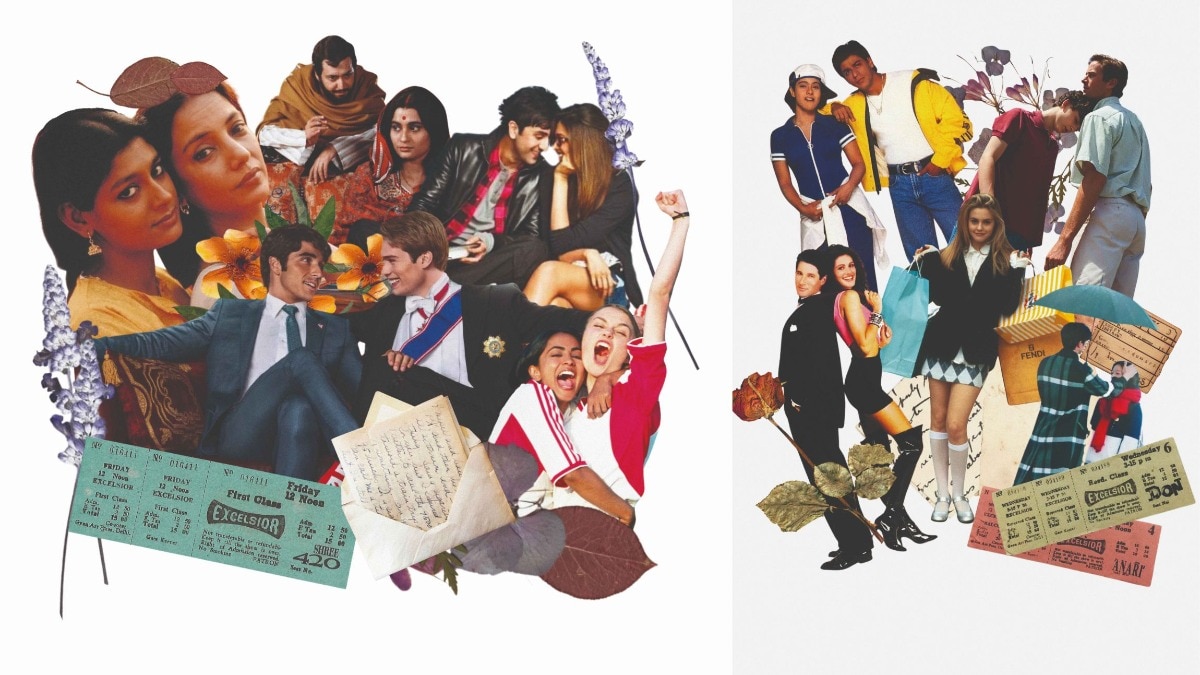
Masaba Gupta talks about her motherhood journey, balancing work and well-being, and more
The August Bazaar cover girl gets candid about her new role as a mother, how she handles criticism, and her plans to venture further into beauty and jewellery.


My most vivid memory of Masaba Gupta dates back to 2010. For my school farewell, I desperately wanted to wear the same orange-bordered net sari with handprints that Sonam Kapoor had worn at Masaba’s first store launch. It was a non-negotiable. Over the past decade, I’ve had numerous conversations with Masaba and always felt comfortable around her. She commands attention whenever she enters a room, and it’s clear she knows people will talk about her. Yet, she remains steadfastly focused on her goal.
When I ask Masaba to describe herself in three words, she promptly replies, “agile” and “chameleon”. After a brief pause, she adds, “assertive”. All of these qualities are evident in her design journey, a path she embarked on after exploring various interests. From studying music in London to considering dance and acting, it was her mother’s practical advice that steered her towards success. “It should be something that requires you to apply your brain and not something that needs physicality,” Neena Gupta had suggested, inspiring Masaba to envision herself as a designer-entrepreneur.
Breaking new ground in India’s traditionally male dominated fashion industry, Masaba approached her career with honesty and boldness. She openly sought investors and embraced collaborations, differentiating herself from her peers. “We did a collaboration with Fiama for shower gels, designed the Tata Nano, and partnered with Titan on watches,” she recalls. These partnerships were instrumental in her brand’s growth. A pivotal moment came with her partnership with Nykaa, which laid the groundwork for
her beauty brand, Lovechild. “That three-year stint with Nykaa was invaluable,” she recalls. “I learned everything—from product development to supply chain management and marketing.” Unlike most celebrity-backed brands, Masaba remains deeply involved in her brand’s daily operations, ensuring it aligns with her vision and values.
Masaba’s brand is deeply connected to her Indian heritage. She finds inspiration in timeless treasures, from her mother’s vintage pieces to her grandmother’s heirlooms. “These pieces hold much more value to me than contemporary sequined saris,” she shares. She expertly balances her creative passion with the realities of business, ensuring her work is both personally fulfilling and commercially successful. “While I may rebel against the system in my own ways, I never let my product suffer because of it. If you keep a keen eye on the art, the commerce often takes care of itself anyway,” she says. Masaba’s ability to adapt and evolve while staying true to her roots has solidified her position as a unique force in fashion.
The designer-cum-entrepreneur has a distinctive approach to handling criticism while she’s at it. Reflecting on the times when her saris were dismissed as “just prints”, she candidly shares her initial reaction. “I have a very peculiar way of registering and absorbing criticism,” she says. “It makes me very angry and aggressive, to be honest. It consumes my thoughts day and night.” However, her response to adversity is inspiring. “I always bounce back. In those moments of feeling terrible, I come up with 20 new ideas. My response to criticism is to prove myself by doing better work.” This resilience is evident in her bridal line, perfected after multiple attempts to understand her audience’s desires. She adds, “I don’t want to be a rigid business person. I operate in tandem with the market, understanding the way India works.” Masaba chose Kareena Kapoor Khan as the face of her bridal line and this speaks of her commitment to authentic storytelling. Kareena, a full-time working mother in her forties, embodied the brand’s ethos. As Masaba explains, “People connect not just with the product but also with the honest lens through which I tell the story.”
Reflecting on her journey, Masaba’s gratitude is palpable. While acknowledging her numerous accomplishments, she remains driven by her vision. “I won’t be content until Masaba is the lifestyle brand I’ve always envisioned.” Her plans include venturing further into beauty, accessories, and eventually, fine jewellery. Masaba is determined to create a global brand with Indian roots. “I want to be the pioneer of Indian luxury on the world stage,” she declares. With a vast domestic market to conquer, she believes there's still immense potential to be tapped. “I won’t be satisfied for another decade, at least,” she adds.

As she graces our August cover with a radiant baby bump, Masaba opens up about her motherhood journey. Inspired by friends, her character in her Netflix show, Masaba Masaba, decided to freeze her eggs. “It’s surprising how my show impacted others,” she reflects. “Many women shared how my character talking about egg freezing encouraged them to consider it.” Recognising the importance of open dialogue, especially for single women, Masaba emphasises the need for support on emotional, financial, and physical levels. She admits the internal conflict between career success and maternal aspirations, but ultimately, she found empowerment in taking control of her future.
Masaba is challenging the often negative perception of motherhood. “People often say, ‘Oh my God, your life is gonna change after a baby comes along,’ but they say it negatively. The whole point of having a baby is to embrace change,” she reflects. After years of a fast-paced lifestyle, she welcomes this new chapter. Following her divorce and while filming her show’s second season, Masaba felt intense societal pressure to find a partner and secure her maternal future after she turned 32. Initially considering freezing her eggs, she changed her mind after discussing the process with her mom, who highlighted its physical demands. “I was warned about the challenges, including injections and downtime, so I decided to take a break.” She planned to revisit the option but unexpectedly discovered her pregnancy.
Initially, Masaba was taken aback by pregnancy’s physical toll. “In November or December last year, I worried about my body completely changing. I had worked very hard for it for over three years, and I was convinced I’d become a completely transformed human being.” However, her perspective has evolved since. “To be honest, it does matter to me what I look like. It’s not vanity; it’s about being fit. I want to be able to play sports and be an athlete—I think that comes from my dad. I have an athlete’s brain when it comes to staying active. I don’t want to be slow and lazy. So, I was concerned, but as my body started to change, I began to feel a strange sense of pride. It’s weird, but I look at myself and think, ‘I don’t know what’s normal anymore’.”
Self-care has become paramount for Masaba now more than ever. She finds solace in Vikram Seth’s translation of the 100 Mandalas and the Hanuman Chalisa. This ritual grounds her after long workdays. “I take care of my skin and belly with intention. I’m also thoughtful about my diet. I’ve distanced myself from those who don’t uplift me and now spend time with individuals who offer positive reinforcement. Seeing my mom daily has been a blessing, given that we haven’t seen each other regularly for years. We now discuss everything related to the baby and our plans for raising this child, which has been incredibly fulfilling,” she shares.
Masaba has learned to balance work and well-being during her pregnancy. “I’ve established a system that allows me to step away from work when needed, without feeling guilty. This approach has been invaluable in balancing my professional responsibilities and personal well-being during this special time.” Beyond fashion, Masaba is venturing into music. She’s working on an album for her upcoming bridal collection. “Music, for me, represents a creative outlet that can reach a wider audience and convey meaningful messages,” she says. Her mantra through it all is to be authentic. “Sharing your struggles helps others relate to you on a deeper level. It’s important to create your own truth and build your own world. It’s important to stay in touch with reality and surround yourself with genuine people who offer honest feedback. This helps, especially in a world that often feels overly glossy and superficial,” she concludes.
Editor and Interview: Rasna Bhasin (@rasnabhasin)
Digital Editor: Sonal Ved (@sonalved)
Photographer: Nishanth Radhakrishnan (@nishanth.radhakrishnan), Feat. Artists (@featartists)
Stylist: Samar Rajput (@samar.rajput05)
Cover Design: Mandeep Khokhar (@mandy_khokhar19)
Editorial Coordinator: Shalini Kanojia (@shalinikanojia)
Hair Artist: Hrishikesh Naskar (@hrishidoeshair)
Make-up Artist: Sandhya Shekar (@sandhyashekar)
Assistant Stylist: First assistant, Rupangi Grover (@rupangigrover); Second assistants: Nida Shaikh and Michelle Lobo
Production Assistant: Riya Kala (@riya_kala)
Location Courtesy: æquō Gallery (@_aequo_)
Artist PR Agency: Think Ink Communications (@think_ink_communications)
Masaba is wearing a blazer, Rajesh Pratap Singh (@rajeshpratapsinghworks); veil (draped as a skirt), Jade by Monica & Karishma (@jade_bymk); earrings, Jessica McCormack (@jessica_mccormack); necklace (used around the waist), Moksh Jewellery (@jewelsbymoksh). Octa Ottoman, single, by designer Florence Louisy (@florencelouisy) for æquō Gallery (@_aequo_), materials: stainless steel, magnetic linen cushion.










